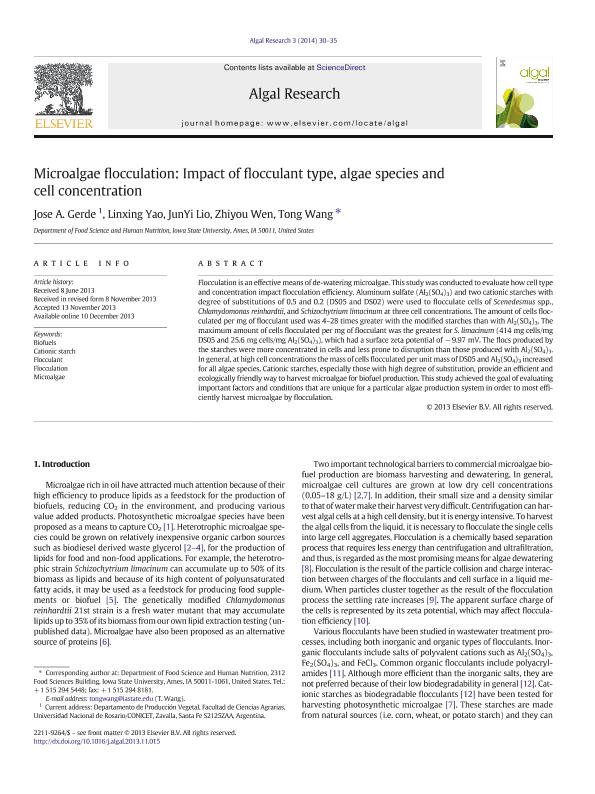Artículo
Microalgae flocculation: Impact of flocculant type, algae species and cell concentration
Fecha de publicación:
01/2014
Editorial:
Elsevier
Revista:
Algal Research
ISSN:
2211-9264
Idioma:
Inglés
Tipo de recurso:
Artículo publicado
Clasificación temática:
Resumen
Flocculation is an effective means of de-watering microalgae. This study was conducted to evaluate how cell type and concentration impact flocculation efficiency. Aluminum sulfate (Al2(SO4)3) and two cationic starches with degree of substitutions of 0.5 and 0.2 (DS05 and DS02) were used to flocculate cells of Scenedesmus spp., Chlamydomonas reinhardtii, and Schizochytrium limacinum at three cell concentrations. The amount of cells flocculated per mg of flocculant used was 4-28 times greater with the modified starches than with Al2(SO4)3. The maximum amount of cells flocculated per mg of flocculant was the greatest for S. limacinum (414mg cells/mg DS05 and 25.6mg cells/mg Al2(SO4)3), which had a surface zeta potential of -9.97mV. The flocs produced by the starches were more concentrated in cells and less prone to disruption than those produced with Al2(SO4)3. In general, at high cell concentrations the mass of cells flocculated per unit mass of DS05 and Al2(SO4)3 increased for all algae species. Cationic starches, especially those with high degree of substitution, provide an efficient and ecologically friendly way to harvest microalgae for biofuel production. This study achieved the goal of evaluating important factors and conditions that are unique for a particular algae production system in order to most efficiently harvest microalgae by flocculation.
Palabras clave:
BIOFUELS
,
CATIONIC STARCH
,
FLOCCULANT
,
FLOCCULATION
,
MICROALGAE
Archivos asociados
Licencia
Identificadores
Colecciones
Articulos(CCT - ROSARIO)
Articulos de CTRO.CIENTIFICO TECNOL.CONICET - ROSARIO
Articulos de CTRO.CIENTIFICO TECNOL.CONICET - ROSARIO
Citación
Gerde, Jose Arnaldo; Yao, Linxing; Lio, JunYi; Wen, Zhiyou; Wang, Tong; Microalgae flocculation: Impact of flocculant type, algae species and cell concentration; Elsevier; Algal Research; 3; 1-2014; 30-35
Compartir
Altmétricas




